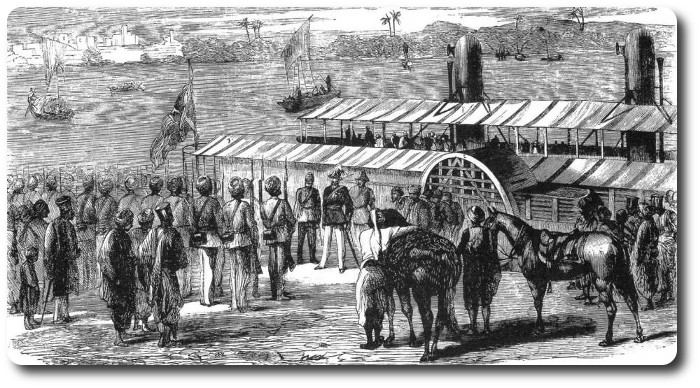Topic: Officers

Sir William Mansfield, arrival at Sukkur, c.1866
The Case of Sir William Mansfield
Morning Chronicle, Halifax, Nova Scotia, 21 November 1866
The case of this gentleman, who was Commander-in-Chief in India, against his Aide-de-Camp, Capt. Jervis, has been decided. It appears from a report of the case contained in a late number of the London Times, that Capt. Jervis had been for some time in charge of Sir William's household expenditure, when two of the menial servants in the establishment accused him privately to their master of embezzlement and peculation in the duties of his office. The Times goes on to say:
"Without the least communication with Captain Jervis, Sir William received the informations of these domestics against an officer and a gentleman whom he had been treating as his friend, and this was the first false step which led, through a succession of mistakes, to the climax of impolicy just now reached. Before hearing what Capt. Jervis himself might have to say, without inviting any conference or personal explanation, he immediately put his Aide-de-Camp on his defence as a man lying under the imputation of dishonest and disgraceful conduct. Such treatment naturally provoked a corresponding attitude on the part of Capt. Jervis, and led to mistakes on his side also. He accepted the hostile position into which he had been driven, and, in his indignation at the stigma, transgressed the limits of discipline easily reached in military service. His behaviour was refractory and even violent, he rejected the proceedings proposed by Sir William, and was at length brought necessarily to trial before a general court martial, not only on the original charges of dishonesty, but on additional charges of insubordination and disobedience."
Then followed a trial prolonged through a space upwards of three months. The details of the proceedings turned not so much upon facts as upon usages and presumptions. According to the report of the case, which we find in the London Times of 27th ult., it was not denied on behalf of the prisoner that he had taken for his own use certain of the stores which the Commander-in-Chief had charge, but it was maintained that though he had no right to appropriate these articles, he had a right, by usage of the service, to borrow them. Touching this point, the Times says:—
"He could draw upon these stores for his own immediate occasions, provided that he charged himself with the cost. It was all matter of account, and very intricate account, in which the defence of the accused was that everything would have been correctly balanced in due time, and every explanation furnished in the interim if he had not been summarily treated as a criminal before the investigation commenced. However, in the end, after a most patient inquiry, the Court, composed of fifteen members, acquitted the prisoner of all the criminal charges, but convicted him of the military charges. In other words, they found that Captain Jervis had not been guilty of embezzling his master's property, but that he had been guilty of breaches of discipline when accused of the crime. Very reasonably, therefore, considering that the only offence proved against him was the immediate result of the provocation which he had received, the Court took this extenuating circumstance into consideration, and recommended the prisoner to mercy. It devolved, however, on Sir William Mansfield himself to give this recommendation effect. He who had been the owner of the missing stores and the master of the household was also the prosecutor in the case, the convener of the Court, and the Judge, as it were, of appeal. Through all his private interests and feelings the matter now came round to him in his high official capacity for decision. On him, as Commander-in-Chief, it devolved at last to say whether the recommendations of the Court should be accepted or not, and whether Captain Jervis should be restored to rank or dismissed the service. Most unhappily, Sir William decided for the latter alternative, rejected the advice of the Court, and confirmed the sentence in all its severity."

